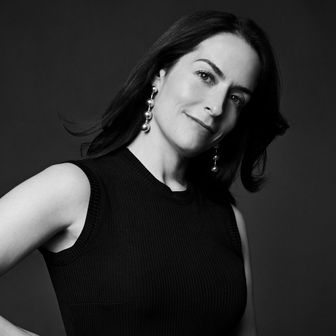

A series investigating the effects of gravity on the female form.
I don’t want to feel bad about my neck. And so far, I really don’t. It looks totally fine. If you saw my neck, you’d agree: There’s nothing wrong with it.
Nonetheless, I’ve been in an ambient state of dread about my neck (and the rest of my aging body) for the last 15 years or so. I’ve been worried on two fronts: (1) That even though I generally feel good about myself, I will grow to hate my own appearance. (2) That other people will hate me because I have stopped being young. I’ve read Nora Ephron; I know how this movie ends. The credits roll and there we all are: accomplished older women, standing in front of our mirrors, pulling at our turkey-wattles, feeling bad.
I bought my first very expensive “anti-aging” eye cream at the tender age of 25. I joked that it was “preventative,” before the term was paired unironically with Botox. I had no sign of wrinkles, but that didn’t stop me from combating them. At 30 I used intense pulse lasers on my sun spots. At 35 I was convinced by an overzealous dermatologist to try glycolic peels and Retin-A. I read about foreskin-stem-cell facials, and instead of horror, I felt intrigued. I researched snail enzymes and LED-light treatments and cryogenic chambers.
Guess what? I still look 40. Maaaaaaybe I could pass for 38 immediately after using one of those terrifying sheet-masks people are always Instagramming.
What’s even more embarrassing than all the prophylactic beauty treatments is that, until very recently, I was engaged in the delusion that I might still be able to get better-looking. I had convinced myself that — through an alchemy of funds, time, self-control, and prayer — I’d finally have all I needed to get my body into what I vaguely referred to as “the best shape of my life.” In my imagined 40s I’d be able to afford Juice Press. I’d find enough resolve to say no to afternoon doughnuts like, “Whatever, big deal, who needs doughnuts?” I’d get enough sleep because I’d be boring and disciplined and never drink on weeknights. Instead of slouching toward decrepitude, I’d be that silver-streaked goddess in the front row at hot yoga. I cringe to admit this, but I looked at how Tina Fey and Gwyneth Paltrow were aging, and I actually thought that could be my trajectory.
I should have seen this line of thinking as early-onset dementia. Instead I took a lifetime of inherited bias against old people and turned it inward. If someone as exceptional as Nora Ephron was powerless to avoid internalized dissatisfaction about her neck, what chance did I stand? And yet, I began to realize, I was more afraid of the feelings that aging would inspire in me, than afraid of the physical changes. After my ridiculous 15-year campaign against the inevitable, I’ve found that I just don’t want to hate my neck, or apologize for my soft upper arms. I don’t want to sacrifice facial expressions any more than I want to be told that a size 12 is too fat.
It’s possible that I’ve come to feel this way because I work with younger women who’ve rejected many of the assumptions held by Ephron’s generation. All I have to do is watch Broad City to be reminded that some of the old rules of acceptable female behavior are being rewritten for the better. Do you need a man to have a baby? Nope. Should a woman apologize for the way she speaks? Um … no? Should you aspire to be on a perpetual diet? Ask the curve model on the cover of the Sports Illustrated Swimsuit issue. Cynics might point to these things as tokenism or aberrations, but I see a wider range of mainstream standards than ever before. Millennial women are already challenging the way beauty companies are marketing their products, rejecting the language of “anti-aging.” While they might not be immune to marketing and vanity, more of them are looking for wellness solutions rather than obsessing over every wrinkle. This is, after all, a demographic that made it cool to dye their hair gray and fetishize Eileen Fisher. Of course, I’m being self-serving, but the millennial obsession with perks of middle age like the Nancy Meyers kitchen encourages me as I drift closer to those years.
I’m not expecting BuzzFeed to add an OLDS category with articles like “21 Things Only Postmenopausal Women Know About Necks,” but I do hope that things will get better. I have faith in millennial women to change things because so many of them are going to start to feel the effects of aging soon. Like me, I suspect they are going to find that they don’t want to worry about being invisible and irrelevant and unemployable just because of the way they look. And when their self-esteem crashes against a societal norm, these are women who tend to push back against those norms. My hope is that their readiness to regard all kinds of personal matters as political statements will usher in a conversation about age-shaming to echo the ones they started about slut-shaming and body-shaming.
I’ve spent an awful lot of time worrying about looking old, and I’m ready to give it a rest. Instead of worrying about looking bad, I would rather recalibrate my sense of what looks good. I want the world to recognize the beauty of time on a woman’s face, and if the world never will, I want, at least, to make peace with it in my own life. I want to be like one of those confident older women who walked in Rachel Comey’s fashion show last season — wrinkles, gray hair, and all. Seeing images of older women treated as normal and beautiful has a profound effect on me. Much like scrolling through the feeds of curve models, it recalibrates my sense of the ordinary and expands my visual vocabulary of ways to look.
Lately I’ve been thinking more about how to avoid the things I’m actually scared of about getting old: becoming set in my ways, stuck in my thinking or narrow in my influences. I want to keep my mind-set open, my life full of voices that are vibrant and diverse. That takes a lot of work too, but I’m confident it will have a greater return on investment than all the creams in the world. That was always the case, it just took me getting older to recognize it.





